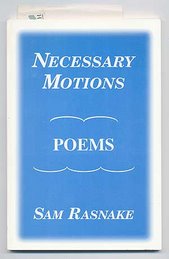I’m fascinated by the recent discussion at Barbara Jane Reyes’ blog on Billy Collins’ comments on bad poetry in The Norman Transcript.
Here’s part of the article:
“One of the reasons people don't read as much poetry anymore is the fault of the poets,” he said. “It’s not the public’s fault. There’s an awful lot of bad poetry out there. I’d say about 87 percent of the poetry in America isn’t worth reading.”
It’s the other 13 percent, Collins said, that he lives for. “Poetry should be transparent. Transparent poems tend to teach themselves.”
Collins edited the 2006 edition of
The Best American Poetry, and noted a similar point in his introduction.
How many poems see the light of print in America each year? To find the answer simply multiply the number of literary magazines in the United States by the average number of poems per issue times the number of issues each year. That’s right: too many. It’s enough to make you wish the NEA would award grants to poets for not writing, like the ones farmers get for not growing crops. And partially because of this glut of publications, there is also a quality problem to be faced. A friend of mine announced one night over dinner that 83 percent of contemporary poetry is not worth reading. Somehow, that number, pulled out of the air, continues to be deadly accurate. I should add quickly that I count myself among those whose lives would be sorely impoverished without the dependable availability of the remaining 17 percent.
I find it interesting that in neither the Norman Transcript article nor his introduction to BAP 2006 does Collins state who might fit into the
worthy of reading group or the
this is trash - avoid it. Why not state your favorites? Why not state the bad? I don’t understand his reluctance. Would that somehow lessen Collins’ universal appeal? Would that be bad poetic politics?
Collins almost always plays it safe, plays the crowd. And he is great at that. Make no mistake. I wish though that he would commit to something beyond the humor of the moment. But I also have to realize that that is who he is. I somehow keep wanting to remake Collins into my vision of Billy Collins - which is, of course, one my own flaws.
*
Several questions do come to mind:
Why do I read poetry?
What is the poetry I gravitate toward?
What is the poetry I don’t like?
What makes a poem a poem?
What are my favorite poems?
So- let me try to answer the first question … and I’ll hold my comments on the other four for another time.
~
Here’s this morning’s visit to
Verse Daily, a poem by Teresa Pfeifer … and it helps me answer, hopefully, question #1:
Matryoshka No house of self, my little Matryona
No more whispers of the war you can hear in there,
No wallpaper with open-winged eagles,
Their beaks repeating themselves.
No empty corners for a comma dalliance,
Umpah, umpah, er ah, twiddler of thumbs.
Neither are there curtains with toy drums
To draft a feeling for the time of day.
Would be relief. Would be sweet.
Open you and there you are,
By diminishing returns.
No in-a-gadda-da-vida, honey.
No sting of cerebellum inside its case.
Rattle you and every door unhinges,
Pop and the cat is purring,
The top whirring and that bird is out.
You never rust from springs.
Countless Springs.
And the voices you hear,
No longer come from things.
*
I like the piece. I like the shift voice from the deliberate and even spiritual resonance of the language in the opening lines to the more direct, hard-edged “No in a-gadda-da-vida, honey” of the poem’s second half.
I do think the Pfeifer’s poem is certainly connected to our poetic tradition. Stanza seven with its “No sting of cerebellum inside its case. / Rattle you and every door unhinges.” – places the writing squarely on the shoulders of Dickinson and Whitman. Whether or not the references are intentional are, for me, unimportant. I make the leap. I do that. It doesn’t matter if Pfeifer intended the connections. I find the connection. And I find it because of what I bring to this poem. It’s the weight of my life that brings itself into the poem.
I read Pfeirer’s poem. I thought about it; I thought about other things relative to it. I went back, and read it again. Thought more. Searched my head – meanwhile that intrusive and iconic song about who-knows-what from an earlier time kept voicing itself. Even that was good. I don’t like the song, but I like this moment. This is a poem I would like to come back to. Find another angle, and enter again. That’s what I look for when I read. And for me, that’s enough to tell me this is a good poem.
I read fiction and non-fiction to go somewehre ... in my head. But I read poetry to find myself, to make me look out a window, to make me pick up a pen.













